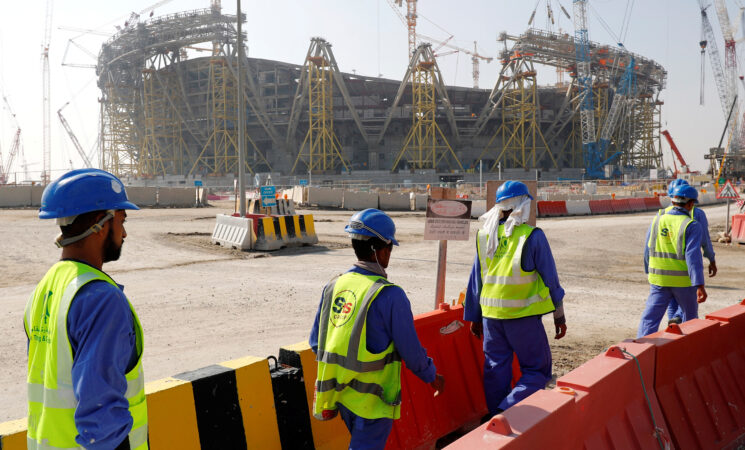11 November 2022, NIICE Commentary 8393
Ruby Khadgi
The Qatar World Cup, football’s largest showcase event, is succeeding in sportwashing its image as the clock approaches the world cup beginning in Doha in just a week. Foreign laborers who sweat in the oil and suffer from it have built all the glitzy stadiums, hotels, roads, and airports that will welcome an estimated 1.2 million tourists to a country with a population of only 3 million.
Sportswashing occurs when an undemocratic or particularly autocratic regime uses sports to restore its tarnished reputation. Now, Qatar is dealing with labor exploitation, homophobia, misogyny, racism, and, to top it all off, corruption. It is in the experiences of thousands of South Asian migrant workers who have been exploited and abused. The project is worth millions of dollars, but the human cost is even more terrifying. According to Nepal’s Foreign Employment Board, at least 1,700 Nepalis have died in Qatar since 2010 while working on the stadium and infrastructure that will allow soccer to be played in Qatar’s scorching heat. The Qatari government denies that number and maintains that just 37 workers have died while working on World Cup stadium building sites, and only three of those deaths were related to their jobs. Although heart attacks and respiratory failure are common symptoms of heat stroke, which can occur when performing hard labor in high temperatures, Qatar does not classify this death as being work-related, according to the International Labour Organization, which claims this results in a significant underestimation. The total death toll is substantially greater because these estimates do not include casualties from several countries, notably the Philippines and Kenya that send huge numbers of workers to Qatar. In 2014, a report from the lawyers for the Qatari government suggested that it will carry out research into the cardiac arrest fatalities of migrant workers and amend the law to “allow for autopsy in all cases of unexpected or sudden death.” Meanwhile, the government has done neither.
The Qatari government committed to implementing minimum wage laws, bettering working conditions, and other promised reforms in 2017. It even released glitzy promotional videos promising to raise the bar for workers’ welfare and the efforts to keep them cool while they work, notwithstanding a commitment to achieve gender equality a male guardianship system still exists, and the rules are complicated because they prevent women from making their own decisions regarding things like marriage and travel. A same-sex relationship is likewise prohibited. In Qatar, homosexuality is forbidden. For homosexual activities, people can be imprisoned and even executed under Sharia law, which is not the progressive modern image FIFA wishes to project at its flagship event. Furthermore, according to the report, Human Rights Watch claimed that the Qatari police were still imprisoning and harassing LGBT people. Josh Cavallo of Australia, the first active male professional football player to come out as homosexual, has concerns about Qatar hosting the world cup. The treatment of LGBTQ+ individuals and women workers has prompted calls for countries to boycott the World Cup, but none of them have done so to date. In a gesture of solidarity for all the construction workers who died, the national jersey of Denmark will wear all-black during the tournament. During qualifying matches, Norway and Germany organized rallies using T-shirts bearing statements supporting human rights. While others continue to believe Qatar may be the land of opportunity, there are many more people being exploited, mistreated, and forced to work without pay, behind the scenes.
On the other hand, the major Brands are seen participating in lucrative sponsorship deals. It has been utilizing its extensive PR apparatus to conceal the murky tales buried behind its magnificent World Cup infrastructure. It has been spending billions to sway the opinions of football players, celebrities, the media, and FIFA officials. According to Amnesty International, 1.7 million migrant laborers, the majority of whom are from India, Bangladesh, Nepal, and Sri Lanka, make up 90 percent of the labor force in the nation. Numerous heartbreaking tales of families who have lost their main earner and are battling for compensation are hidden behind the numbers. According to Nicholas McGeehan, Director of Fair Square Research and Projects, a UK-based organization that focuses on migrant issues claims that” FIFA has repeatedly abdicated all responsibility for all the harms and abuses associated with the Qatar World Cup. “FIFA will stand up for the state of Qatar and praise its efforts, irrespective of how Qatar treats migrant workers and irrespective of how many it deports. FIFA, under the reign of Gianni Infantino, has carried on from where Sepp Blatter left off – it cares about profit and power, and it doesn’t care who gets trampled underfoot”. He further argues that the current situation is that governments like Nepal are so economically dependent on remittances that they feel they can’t be assertive on rights issues, and the people who pay for that are Nepali workers and their families. For far too long, the Gulf States have exploited the economic weakness of the countries that supply them with workers, playing each off against the other and driving wages and protection down. However bilateral and multilateral forums have achieved little substantive progress, allowing Gulf governments to claim engagement while maintaining a highly detrimental and unjust status quo. Even though the region’s economy relies largely on remittances sent by migrant workers, South Asia has typically placed migrants’ concerns at the bottom of its priority list. This is unlikely to alleviate the suffering in hundreds of distant families, where heartache will persist long after the world cup is over.
Ruby Khadgi is Masters' Student at Victoria University, Melbourne, Australia.

